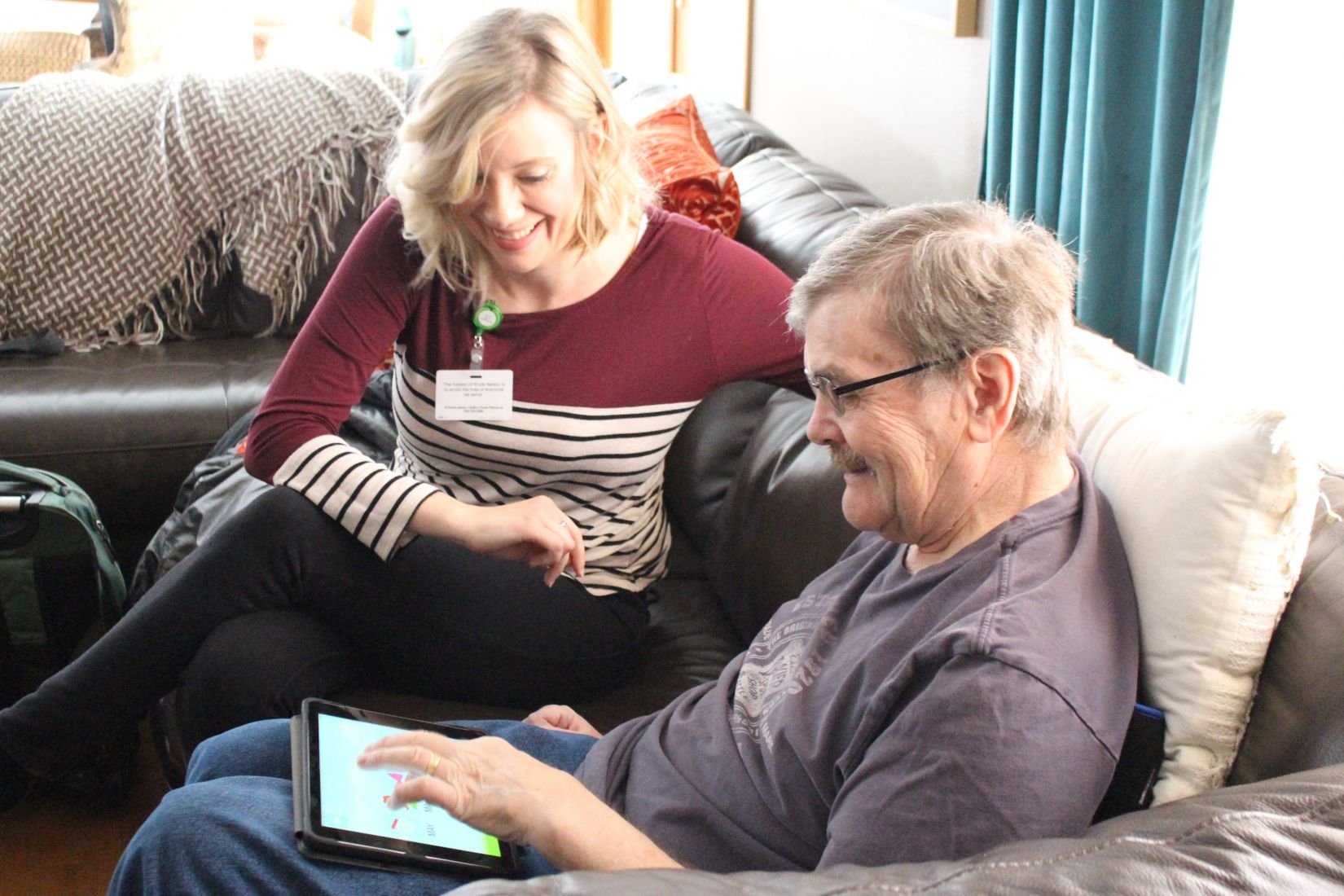From Whiteboard to “Hi, there!”
May 28, 2019
Dave’s Long Journey Back to Speech
“Hi, there!” When Dave said those two words not long ago, he connected with his grandson.
Communication between toddler grandkids and their grandparents often goes something like this: “Look at this! Why does it rain? Do you want to see me do a somersault? Can I have a snack?” But it’s a two-way street. To make the conversation engine go and build relationships, grandparents need to respond.
When Dave said, “Hi there!” he initiated a relationship that wasn’t possible before. “He couldn’t do that before,” said Stacy Denny, Knute Nelson Home Care speech-language pathologist.
He’s been using a whiteboard and showing his family what he needed. Or, his family had to guess. “We had a number of questions we could go through. ‘Diet Coke?’ ‘Ranger?’ (his truck),” said his son Dan.
How it all started
Eighteen years ago, Dave Willard was a 50-year-old, all-around active guy. As an Adult Farm Management Instructor, he helped farmers with their business plans and marketing. He had quite a few clients and really enjoyed his job. Then he had a stroke.
It took him over a year in acute rehab before he could live at home with his late wife, Judy. Although he had weakness on his right side, “he was still able to get back to the activities he enjoyed: fishing, mowing the lawn, driving his side-by-side,” said Dan.
There was just one hitch: he could only speak a few words.
Speaking again – after 17 years
Fast forward 18 years and Dave broke his hip. It turned out to be his gateway to speaking again.
While he was recovering in rehab, he tried speech therapy again made some progress.
“I didn’t think there would be much chance for improvement,” said Stacy Denny, Knute Nelson Speech Language Pathologist. “It had been so long since his stroke.”
“When I evaluated him, I realized he had pretty severe apraxia. I knew I could help him with that. It’s not a matter of intelligence but getting the words out.”
“He’s saying words I haven’t heard him say in a long time”
Dave made quick progress. “In his speech therapy sessions, we work on helping plan the sounds,” says Stacy. “Apraxia is all about motor planning. Dave knows what he wants to say but he has trouble saying it.”
They’re also working on spontaneous speech. Right now, he needs cues to get started. “If you give him a fill-in-the-blank cue, he can finish it. ‘The cow is … brown.’ ‘This is a … couch.’”
He’s come a long way. When he first started therapy, Stacy asked him to name objects in the room (without prompting). The goal: name 20 things. “He couldn’t name any. The last time we did this he could name 18 or more.”
On Stacy’s suggestion, his family purchased an iPad and downloaded an apraxia app. “It doesn’t provide therapy,” she says. “But it provides sounds and words so he can practice between therapy sessions.”
“His therapy is intense,” says Stacy. “He’s OK with that.” (Dave now has speech therapy for 45 minutes, twice a week.)
“He does his exercises every day, practices his speech every day,” says Dan. “He’s very driven and he’s definitely gotten a lot better. He’s putting smaller sentences together and saying words I haven’t heard him say in a long time.”
There’s work ahead but the future is bright
“He still needs quite a bit of help shaping words,” says Stacy. “For example, the sounds he
 produces are sometimes in the incorrect position. Shaping helps you get the tongue and lips into the correct position.”
produces are sometimes in the incorrect position. Shaping helps you get the tongue and lips into the correct position.”“The hope is that he’s able to come up with more and more words spontaneously. And then supplementing as needed with the iPad to meet his wants and needs.”
Dave and his family are delighted with his progress. They didn’t think speech was possible again. Dave and Stacy are making it happen.
After the stroke: do’s and don’ts for communicating with your loved one
It can be tough communicating with your loved one if a stroke affected their speech. Here are some do’s and don’ts to make it easier.
Do’s*
● Speak in a natural tone and volume unless your loved one has hearing loss.
● Repeat back what you heard to make sure you’ve understood.
● Resist the temptation to answer questions for them.
● Ask yes/no questions.
● Allow them time to process the information or question.
Don’ts*
● Don’t talk down to them or use “baby talk.”
● Don’t pretend to understand what they’re saying if you don’t.
● Don’t rush them to answer your questions.
*American Stroke Association; Stroke Association, United Kingdom
Learn more
Interested in learning more about Knute Nelson Home Care or speech therapy? Contact us at (320) 759-1273 or visit the home care page and fill out our inquiry form.

